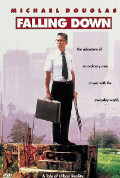
Directed by
Joel Schumacher
115 minutes
Rated M
Reviewed by
Bernard Hemingway

Falling Down
Although neither commercially nor critically successful Falling Down has achieved near cult status for its sympathetic portrayal of an average Joe (referred to only as D-Fens) beaten down by the pressures of modern urban life (and specifically the late '80s economic downturn) but struggling to regain his sense of self one hot L.A. summer’s day.
Whilst mainstream director Schumacher is far from subtle in his treatment of the story one needs to understand the time at which the film was made, one in which America was suffering from a raft of economic and social problems, particularly in the inner cities, in order to appreciate the insistent depiction of societal malaise.
In part the film's appeal stems from the dubious but nevertheless entertaining action-movie theme of the little guy revenging himself on the world he thinks has wronged him but its strength is that it does this via the story of two engaging characters: Bill (Michael Douglas), the redundant, recently-divorced and severely alienated white collar worker and Prendergast (Robert Duvall), the aging cop who has his own problems trying to deal with the demands of his neurotic wife (Tuesday Weld) who has never gotten over the death of their 2 year old child from SIDS.
For much of the film Schumacher nicely follows the two men's trajectories building to what we know will be an inevitable confrontation. Both Douglas and Duvall are effective in their relatively unchallenging parts although ultimately the film is compromised as a drama by its inability to find the right tone, shifting too readily from comedy to tragedy and lacking in the nuance that would have made the characters feel real instead of merely neatly drawn. This is particularly so in depicting D-Fens' relationship with his ex-wife (Barbara Hershey). Only at the film’s very end does it become clear that he has had serious anger management issues that caused the marriage to break down. In addition, as D-Fens actions become progressively more vindictive and calculated we tend to lose our sympathy for him. Although this is re-couped somewhat in the penultimate scene in which Douglas utters the classic line “I’m the bad guy?”, the denouement is decidedly ho-hum as D-Fens and his problem are brushed aside like a minor irritant and life returns to normal.
FYI: For a more dramatically effective treatment of the theme, see The Assassination Of Richard Nixon.
Want something different?





